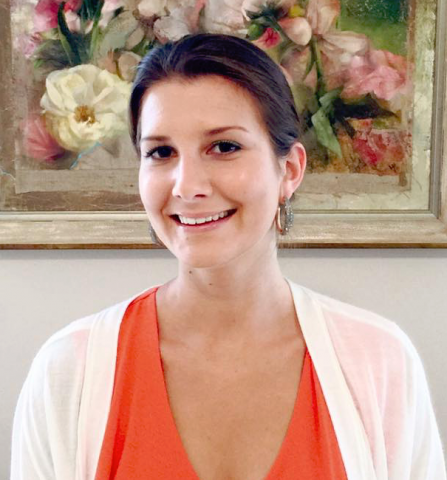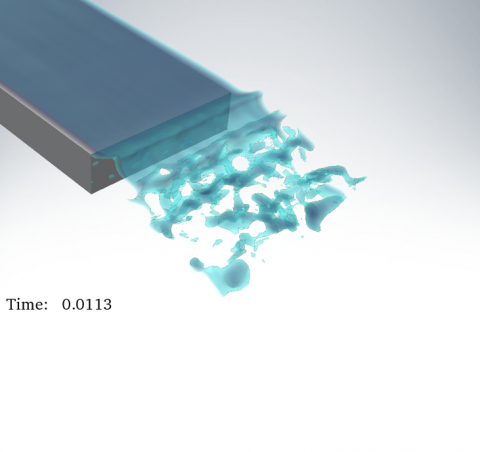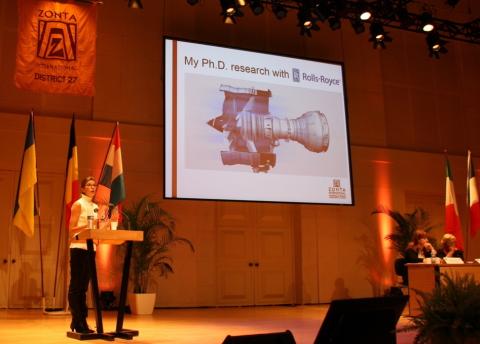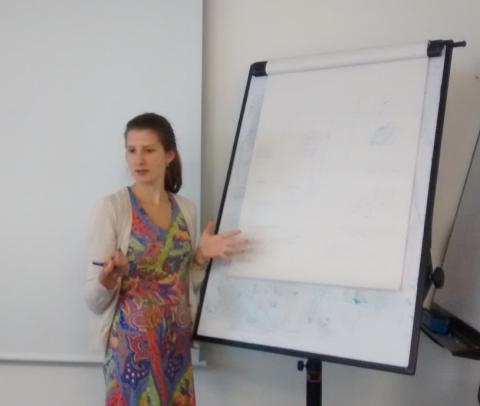Profile of Camille Bilger
Camille is a PhD student working on the numerical simulation of fuel injection in jet engines
(interviewed by Girish Nivarti)
How did you get into Engineering?

My path to engineering has been unusual. I always hated mathematics, my parents didn’t have a scientific background either — no one ever told me “oh, look at the stars!” To add to that, I was terrified by classes in technology and soldering which I had attended in middle school. Coming from a broad educational background in France, with equal weightage to science and literature, I was more inclined towards natural sciences. I pursued a degree in Physics at St. Andrews to set foot in a new academic system where I specialised in Astrophysics. I studiedweather patterns on Earth and chemistry formation in exoplanets and I absolutely loved it! But I found my true love for fluid dynamics when I was working on compressible shock waves at the German Aerospace Centre. A following masters degree in Energy Technologies in Cambridge exposed me to the best in world class research. Here, I connected at a deeper level with the broad structure of the curriculum which culminated into a masters thesis under my current PhD supervisor. I liked his style, the topic was fun and I haven’t looked back since.
What is your research focused on?

My project focuses on understanding the physical behaviour of fuel injection under operating conditions in Rolls-Royce jet engines. Today, a lot of the research in this field relies on high order computational methods; my work uses these methods to investigate the atomisation of kerosene into sprays. An improved understanding of the physical phenomena governing atomisation will help us control the processes that affect the efficiency of jet engines. I am presently investigating a method to classify the regimes of interaction between air and fuel as they are injected in the combustor chamber of jet engines and the breakup process.
What motivates you?
My doctoral project is not the primary research focus of my supervisor’s group. I am motivated by the prospects of building new ties with prospective collaborators around the world. Indeed, we have done so and presently we are collaborating with a group in the City University of London on multiphase flows and interface-tracking methods. Since we as a group have not yet made an impression on this niche field, I have a sense of responsibility for increasing the visibility of the group through such collaborations and by networking with societies with a similar research interest. Of course, I also like the science of simulating fluid sprays — it involves numerical, mathematical and physical aspects in equal doses.
What has helped you in your career so far?
I have been lucky that my parents were able to fund me up to my undergraduate degree. Since undergraduate however I have been able to procure funds from many sources. My tuition fees at St. Andrews was funded by the Scottish government, and my masters in Cambridge was funded by the Airbus Group. Presently Rolls-Royce sponsors my PhD project and funds my conference visits which allows me to showcase the science and receive critical feedback from peers. I have also received several awards from societies and international organisations and that have encouraged me to improve academically and pursue further research! I am also thankful to the counselling support at St. Andrews and at Newnham College in Cambridge. It has been essential for my health and growth as a student through all my degrees.
What is the most difficult situation you’ve faced?
Throughout my childhood, I had been pushed to be the best and it was implicit that failure wasn’t an option: my parents expected me to achieve all my goals successfully. Aiming constantly for the top of the top drives you, but when I look back, I realise that it was detrimental to my health. While applying for undergraduate degrees, I wasn’t accepted at Cambridge and that was overwhelmingly, stressful and discouraging. I have gradually learned with time and through counselling to not be broken by failure and instead learn from it — nothing should stop you from your dreams but it shouldn’t come at the expense of health.
What is an achievement you are proud of?
The first paper I published was quite big for me. It was the product of a six months long project with a strict, rigorous and passionate supervisor: Dr. Christiane Helling. I am really thankful to her for pushing me to get my act together and invest lots of hours in it. I remember doing and redoing and redoing again each of the 20-odd graphs in the paper until we attained a high quality worthy of publication which we wrote together — I absolutely loved it all! [In fact,] this blossomed into two more papers from collaborations that sprung within the laboratory, one of which was with my good friend. It was a lot of fun.
Have you been able to pursue non-academic activities?

Of course. Actually I have found that it works best for me when there is a balance among academic and non-academic activities. I am intrigued by the administrative side of the academic ladder — the department is run not just by us researchers but by people who work hard on running the infrastructure. I like to contribute to the system by organising conferences and administrating committees within and outside the department. I have been working closely with the Athena Swan committee which is focused on understanding measures needed to attain equality and diversity within the university. We are organising a conference this week to welcome students and staff to comprehend and address “Unconscious Bias”. I am also the Events Coordinator of the UN Women Campaign HeForShe in Cambridge which is geared towards encouraging men to be part of raising awareness on this issue.
How do you manage family life?
Work-life balance is very important for me. I am close to my family and I have been in a long distance relationship during my PhD. Although academia allows one the flexibility to travel several times a year, one always battles with their own career ambitions. In this light, I feel that I am willing to sacrifice some of my academic success to spend quality time with my family and my partner. I am grateful that my supervisor is respectful of these individual needs.
Do you have any role models?
Like many women in male-dominated environments I have often found it difficult to relate to my male colleagues or lecturers, and most importantly to find myself a mentor. However, I have been extremely fortunate to have witnessed my astrophysics thesis supervisor, Dr. Christiane Helling both at a professional and personal level. She is ambitious, confident and independent and yet she has a family — a husband and a daughter — which sets out an inspirational example for aspiring women scientists. She has even written a book to explain astrophysical phenomena to lay persons! I also respect Prof. Stewart Cant, my PhD thesis supervisor, because he places a lot of emphasis on his own family alongside work and that inspires me to continue in the field. Other than that, Dr. Jenni Sidey is my most ‘direct’ mentor whom I look up to and think “I could become her in a few years”.
What are your plans for the future?

At the moment, I am still torn apart between possibilities after my PhD. I am inclined towards academia because I would be happy to pursue research, collaborate, apply for funding and teach; but presently I am uncertain about the exact areas of study I would take on. Although I can see myself as a professor at a respectable university, I find that the climb up the ladder is quite unsettling because of the uncertainties involved in finding tenure and for a woman this pressure can be quite vivid. Perhaps I will join an aerospace industry in the mean time: I am not entirely decided yet.
What advice do you have for prospective women engineers?
In this day and age, we see women in biology and other fields but most of us are intimidated by engineering. Through my unusual academic path, I have realised that engineering is whatever you want it to be. It does’t have to be soldering and it doesn’t have to be spending hours lifting instruments in the laboratory: you won’t find me in the lab wearing a yellow helmet! Especially engineering research inculcates elements from all different fields: there is room for a physicist, for chemists and biologists and mathematicians. I encourage women to consider engineering [instead] for the problems and projects that might interest them.
